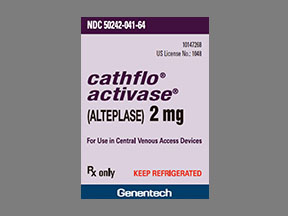
Cathflo Activase Coupons & Savings Card – Discount Prices from $182.83
My prescription
Edit
2MG, Cathflo Activase (1 Solution Reconstituted)
Select pharmacy

CVS
$215.31
COUPON PRICE
Walmart
$182.83
COUPON PRICE
Walgreens
$193.82
COUPON PRICE
Albertsons
$202.97
COUPON PRICECathflo Activase savings card
Show this card to your pharmacist
Walmart
$182.83
BIN
ID
PCN
GRP
019876
LHC4690445
CHIPPO
LHX
Powered by
Price history for Cathflo Activase
1 Solution Reconstituted, 2MG
Average retail price for Cathflo Activase
Average SaveHealth price for Cathflo Activase
Our price history data is based on aggregated prescription data collected from participating pharmacies in America. Our prescription data updates daily to reflect the latest price changes. If you notice a missing data point, it means there wasn't sufficient data available to generate a monetary value for that date.
*Retail prices are based on pharmacy claims data, and may not be accurate when we don't have enough claims.
Cathflo Activase dosage forms
Dosage Quantity Price from Per unit 2MG 1 Solution Reconstituted $182.83 $182.83 2MG 10 Solution Reconstituteds $1988.36 $198.84
| Dosage | Quantity | Price from | Per unit |
|---|---|---|---|
| 2MG | 1 Solution Reconstituted | $182.83 | $182.83 |
| 2MG | 10 Solution Reconstituteds | $1988.36 | $198.84 |
What is Cathflo activase used for?
Cathflo Activase is used to restore function to central venous access devices that have become occluded due to blood clots. It is a thrombolytic agent that helps dissolve the clots, allowing the device to function properly again.
When should you not use Cathflo?
Cathflo (alteplase) should not be used in patients with known hypersensitivity to alteplase or any component of the formulation. It is also contraindicated in patients with active internal bleeding, recent intracranial or intraspinal surgery or trauma, or in those with a history of intracranial hemorrhage. Additionally, it should not be used in patients with severe uncontrolled hypertension or in situations where the risk of bleeding outweighs the potential benefits. Always consult a healthcare professional before use to ensure it is appropriate for the patient's specific condition.
When is it unsafe to use Cathflo on a patient with an occluded catheter?
It is unsafe to use Cathflo (alteplase) in patients with known hypersensitivity to alteplase or any component of the formulation. Additionally, it should not be used in patients with active internal bleeding or those with a history of intracranial hemorrhage. Caution is advised in patients with recent major surgery, trauma, or severe uncontrolled hypertension. It is important to evaluate the patient's medical history and current condition before administration.
How does Cathflo Activase work?
Cathflo Activase works by dissolving blood clots that may be obstructing catheters. It contains alteplase, a tissue plasminogen activator, which helps convert plasminogen to plasmin, an enzyme that breaks down fibrin, the main component of blood clots. This action helps restore the patency of the catheter, allowing for proper function.
Who can administer Cathflo?
Cathflo, also known as alteplase, should be administered by healthcare professionals who are trained and qualified to handle thrombolytic agents. This typically includes doctors, nurses, or other medical personnel who have received specific training in the administration of this medication. It is important that it is administered in a clinical setting where the patient can be monitored for any potential adverse reactions.
